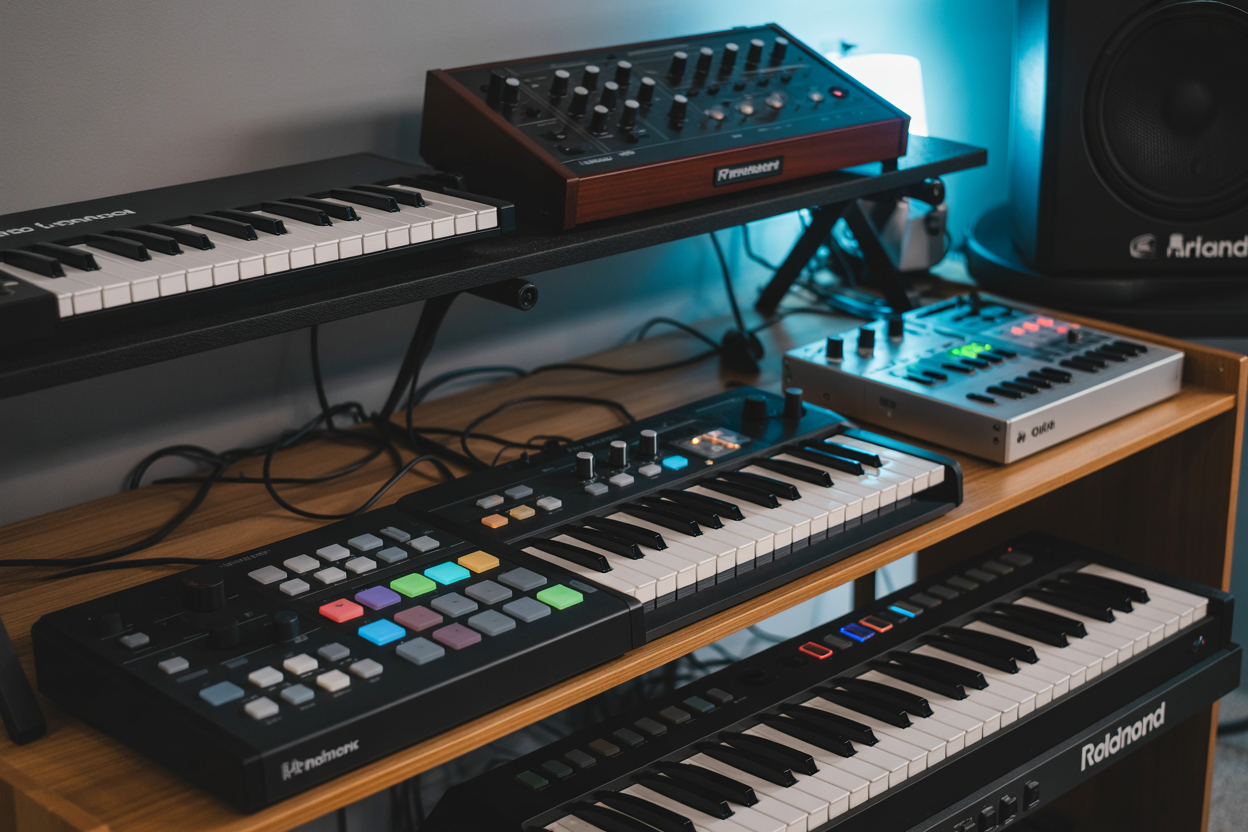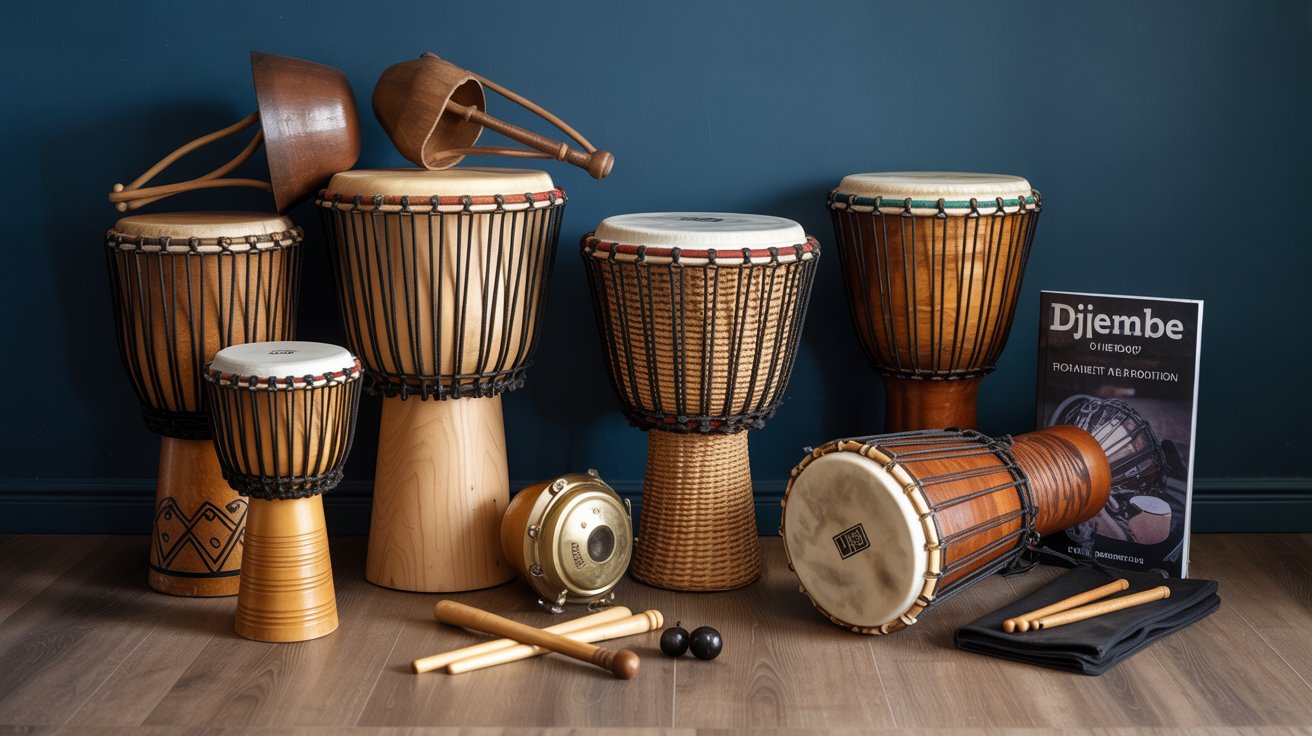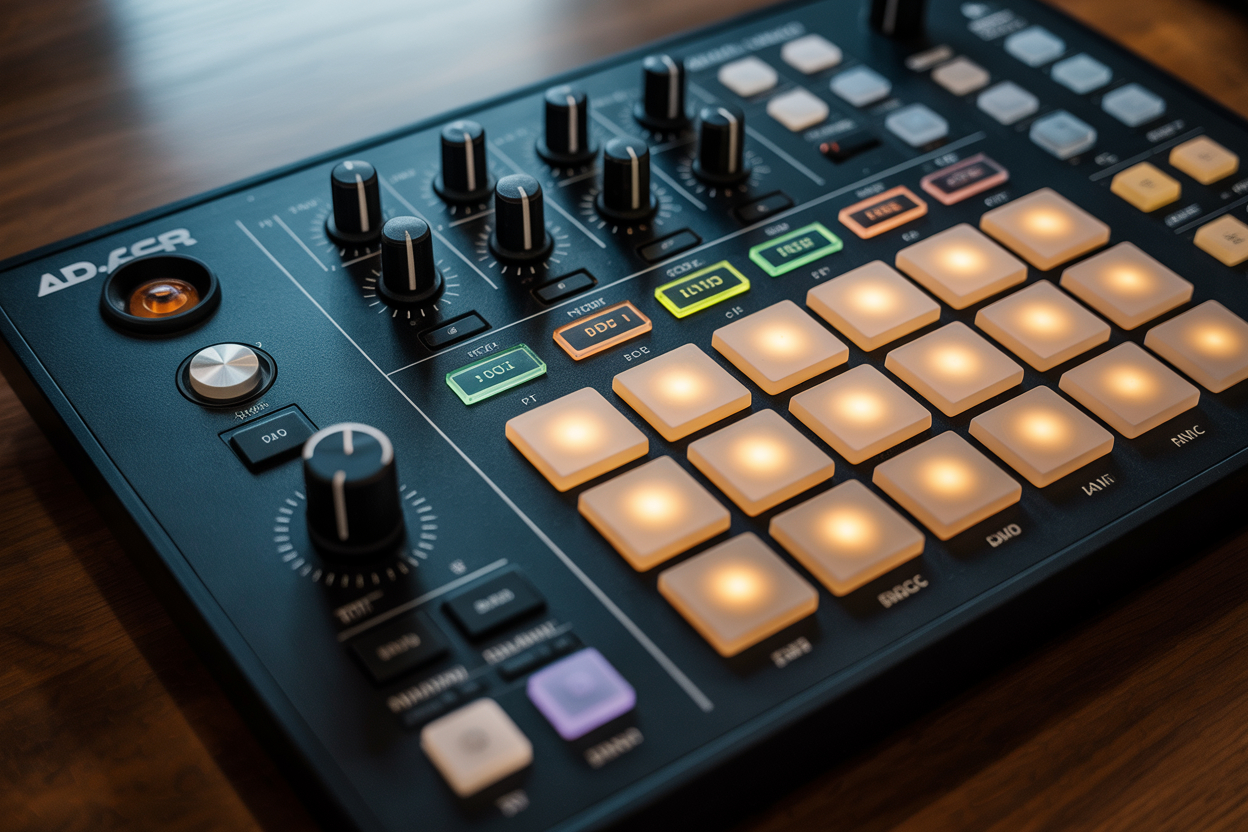Future Production Methods: Tomorrow's Foundation
Next-Generation AI-Powered Sample Creation
The integration of artificial intelligence into Afro House production will reach unprecedented levels by 2026, fundamentally transforming how producers will approach sound creation. With music AI platforms expected to surpass 100 million users and 25% of consumers projected to use generative AI for music creation, the traditionally labor-intensive process of creating authentic African percussion patterns will become instantly accessible to producers worldwide.
Advanced AI platforms will evolve beyond current capabilities, allowing producers to generate Afro House tracks using complex natural language prompts such as "Create a 124 BPM Afro-House groove with evolving polyrhythmic congas, vintage Fender Rhodes progressions, and authentic Xhosa vocal harmonies". Future AI-driven composition engines will generate complete arrangement structures—including multiple bassline variations, adaptive drum patterns, and dynamic lead elements—within seconds, while maintaining unprecedented authenticity and cultural sensitivity.
YouTube Tutorial Reference: Current techniques shown in "How To Make Afro House 2025!" demonstrate the foundation for these advanced AI-assisted workflows
The democratization effect of future AI will extend far beyond sample generation. Predictive polyrhythmic intelligence will understand how to automatically layer percussion and synths to mirror Afro House's most complex timing variations, while learning from traditional African drumming masters to create patterns that honor cultural authenticity. This development will enable bedroom producers to create intricate polyrhythmic compositions that will rival the work of seasoned percussion ensembles.
Revolutionary VST Innovations and Synthesis Evolution
The landscape of virtual instruments will undergo radical transformation by 2026, with new technologies specifically designed for Afro House's unique requirements. Advanced physical modeling synthesis will achieve photorealistic accuracy, with next-generation plugins simulating not just the sound but the complete tactile response of traditional African instruments, including breath dynamics for wind instruments and hand positioning variations for percussion.
Future Afro House production will rely on AI-enhanced hybrid synthesis approaches that learn from cultural instrument databases. Evolutionary FM synthesis algorithms will create authentic-sounding kalimbas, marimbas, and djembes that adapt in real-time to playing styles, while neural network-powered analog modeling will provide unprecedented warmth and character in digital synthesizers.
YouTube Tutorial Reference: Techniques demonstrated in "How To Make Afro House Like Hugel - FL Studio Tutorial" will serve as the foundation for advanced VST programming approaches
The integration of quantum-inspired wave manipulation and contextual modulation will open entirely new possibilities for creating unique textures. Producers will use adaptive FM modulation that responds to rhythmic context, while intelligent wave morphing will add culturally appropriate variations that mirror the natural fluctuations found in traditional instruments.
Advanced Polyrhythmic Programming: The Digital Evolution
Revolutionary Rhythmic Structure Creation
The heart of Afro House will continue to lie in its complex polyrhythmic foundations, and 2026 will witness revolutionary advances in how these patterns are conceived and programmed digitally. Future polyrhythmic engines will employ machine learning to analyze traditional African drumming patterns and generate infinite variations that maintain cultural authenticity. These systems will understand not just the mathematical relationships between rhythms, but their cultural significance and emotional impact.
The traditional 3:2 clave pattern will serve as a foundation for more sophisticated structures, with AI-powered composition tools generating complex variations like adaptive 5:4 cross-rhythms and intelligent 7:6 Afro-Cuban fusions. These patterns will create dynamic rhythmic tension that evolves throughout tracks. Next-generation beat programming software will offer intuitive interfaces where producers can "paint" polyrhythms onto circular canvases, making the most complex patterns accessible to producers at all skill levels.

An Ableton Live electronic music production setup featuring MIDI controllers, synthesizers, and a Roland TR-8 drum machine
Intelligent Organic Percussion Integration
The integration of organic percussion elements will achieve new levels of sophistication through AI-powered analysis and recreation systems. Future percussion libraries will feature not just samples, but complete behavioral models of traditional instruments that respond to playing techniques, room acoustics, and ensemble dynamics. These libraries will learn from master percussionists to provide authentic performance variations that evolve based on musical context.
Producers will employ hybrid AI-organic approaches that analyze live recordings of traditional instruments like djembes, congas, and shakers, then use machine learning to generate infinite variations while preserving the organic character and cultural authenticity. Smart processing chains will automatically apply culturally appropriate effects and filtering that enhance rather than mask the natural character of traditional sounds.

A collection of African percussion instruments including djembes, shekeres, cowbells, and a djembe guidebook illustrating traditional instruments used in Afro house music production
Future production workflows will feature predictive sequencing and intelligent syncopation systems that understand the cultural context of different rhythmic patterns. These tools will suggest complementary percussion elements and optimal placement timing, while learning from traditional ensemble arrangements to create authentic layered textures.
Technical Evolution: BPM, Swing, and Velocity Mastery
Adaptive BPM Ranges and Intelligent Swing Systems
Afro House production in 2026 will maintain its traditional 120-126 BPM range while introducing dynamic tempo variations and AI-powered swing adjustment that responds to musical content in real-time. Intelligent groove templates will analyze the cultural context of rhythmic patterns and automatically apply appropriate swing percentages and microtiming adjustments that honor traditional playing styles.
Next-generation swing algorithms will move beyond simple percentage-based adjustments to contextual timing intelligence that understands how different percussion instruments should interact within polyrhythmic structures. Advanced velocity mapping will use machine learning to apply realistic dynamic variations that mirror the natural expression of master drummers, with MIDI data intelligently distributed across the 0-127 range based on musical context.
The science of future groove creation will incorporate biometric feedback analysis from traditional drummers to understand the micro-movements and tension patterns that create authentic feel. These insights will inform adaptive humanization algorithms that apply perfectly calibrated timing and velocity variations.

ADSR Drum Machine interface showing drum pads, detailed control panels, and sound shaping tools for advanced rhythmic programming and sample manipulation
Predictive Groove Programming Systems
Future Afro House production will employ AI-assisted off-grid placement where intelligent systems understand optimal timing for hi-hats, claps, and percussive elements based on the overall rhythmic context. Contextual polyrhythmic layering will automatically suggest complementary patterns that enhance rather than compete with existing elements, creating seamless rhythmic interactions.
Adaptive humanization engines will analyze the emotional content of tracks and apply appropriate levels of timing variation and velocity adjustment. Rather than random humanization, these systems will understand when precision serves the music and when subtle variations enhance the groove. This intelligent approach will elevate professional productions to new levels of authenticity and emotional impact.
Sample Culture Revolution and Global Democratization
Next-Generation Quality Sample Ecosystems
The democratization of Afro House production will reach new heights by 2026 through AI-curated sample ecosystems that provide not just sounds, but complete cultural context and usage guidance. Intelligent platforms will offer extensive libraries where each sample comes with historical background, traditional usage patterns, and AI-generated compatibility suggestions for modern production contexts.
Future sample packs will feature adaptive content that responds to producer preferences and cultural sensitivity settings. Collections like the evolved "Afro House Go Deep" series will include not just audio files, but interactive cultural guides and AI tutors that teach proper usage and cultural context for traditional elements. These educational components will ensure that global producers maintain respect for African musical traditions while contributing to the genre's evolution.
Premium cultural authenticity verification will become standard, with sample packs certified by traditional music councils and featuring blockchain-verified cultural authenticity that ensures proper attribution and cultural respect.
Traditional African percussion instruments including a djembe drum, bongos, and woven shakers commonly used for organic percussion in Afro house music
Global Production Community Evolution
The accessibility of culturally authentic Afro House samples will create an interconnected global production network where AI translation systems enable cultural exchange between producers who speak different languages. Intelligent collaboration platforms will match producers based on complementary skills and cultural knowledge, fostering authentic fusion while maintaining genre integrity.
Cultural education integration will become mandatory in major sample platforms, ensuring that producers understand the historical and social context of the elements they use. Community validation systems will provide feedback from cultural experts and traditional musicians, creating a self-regulating ecosystem that promotes respectful innovation.
The economic impact will extend to direct artist compensation systems where traditional musicians receive royalties when their cultural contributions are used in global productions. Smart contracts and cultural preservation funds will ensure that the commercialization of Afro House contributes to the preservation and development of traditional African music.
Future Production Workflow Integration
Advanced DAW-Specific Evolution
Future Afro House production workflows will be revolutionized by AI-enhanced DAW capabilities specific to each platform. Ableton Live 2026 will feature intelligent session view arrangement that suggests optimal clip combinations and automatically applies culturally appropriate groove templates based on the detected musical context.
FL Studio's evolution will include predictive polyrhythmic programming where the piano roll anticipates optimal note placement for complex African rhythms, while AI-powered synthesis engines will generate authentic traditional instrument sounds in real-time. Integrated cultural advisors will provide real-time feedback on cultural authenticity and historical accuracy.
Logic Pro's future iteration will offer comprehensive world music libraries with interactive cultural guides and AI-powered arrangement assistants that understand traditional ensemble structures and suggest authentic instrumentation combinations.
Intelligent Hardware-Software Ecosystem
The trend toward AI-integrated hardware-software ecosystems will define professional Afro House studios of 2026. Smart MIDI controllers will learn individual producer preferences and automatically configure optimal settings for different traditional rhythmic patterns. Intelligent synthesizers will adjust their sound characteristics based on the cultural context of the production, ensuring authenticity while maintaining creative flexibility.
Predictive performance capabilities will anticipate producer intentions, with controllers that suggest rhythmic variations and groove modifications in real-time. Adaptive hardware interfaces will reconfigure themselves based on the traditional instrument being emulated, providing tactile feedback that matches the authentic playing experience.
Cultural Impact and Future Directions
Global South Innovation Leadership
The rise of Afro House reflects a continuing shift in electronic music culture, where the 'Global South' will dominate innovation and creativity throughout the 2020s. Projections indicate that 90% of new streaming subscribers by 2026 will come from the 'Global South', cementing a fundamental shift in where musical innovation originates and how it spreads globally.
This cultural evolution will have profound implications beyond production techniques. The authenticity and community-focused approach of African electronic music scenes will provide the model for sustainable creative development that contrasts with commercialized Western approaches. Africa's creative ecosystem will serve as the blueprint for "how all electronic music should develop—something real and exciting and led by emotion and community".
Conclusion
The production revolution approaching in Afro House represents a convergence of ancient African musical wisdom with tomorrow's most advanced digital technology. The democratization achieved through intelligent sample ecosystems, AI-powered creative tools, and culturally aware VSTs will create unprecedented opportunities for producers worldwide to engage respectfully with this culturally rich genre. However, the most successful future productions will maintain deep respect for the genre's roots while pushing technical boundaries into unexplored territory.
The future of Afro House production lies in continued innovation that serves the music's emotional and cultural core with even greater precision and authenticity. As the genre prepares to solidify its position as the dominant global electronic music force, producers who master both the advanced capabilities of future tools and the deep cultural understanding of African musical traditions will lead the next revolutionary phase of evolution. The 2026 revolution will not just be in the tools we use, but in our approach to achieving perfect balance between authenticity and accessibility, tradition and innovation, local culture and global reach.


